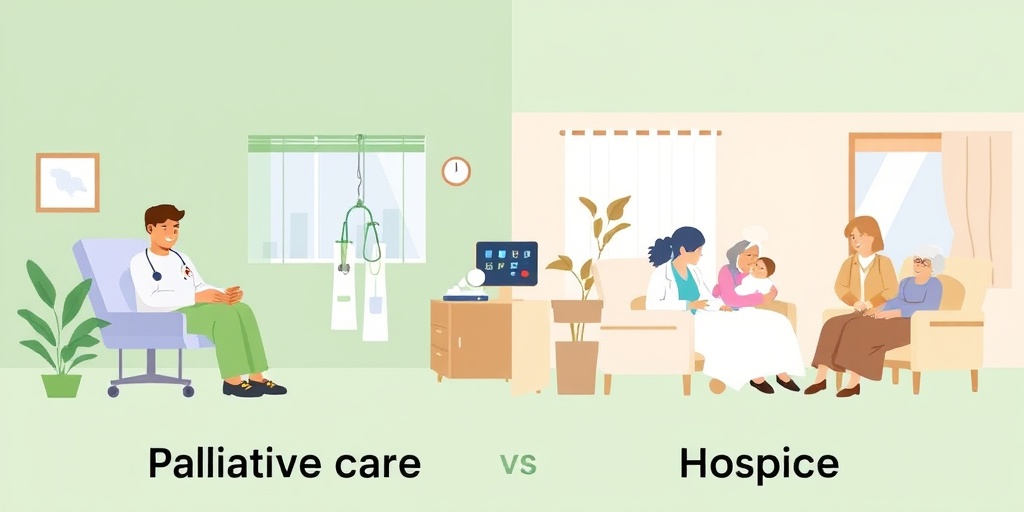What Is Palliative Care?
Palliative care is a specialized medical approach aimed at improving the quality of life for patients facing serious illnesses. Unlike curative treatments that focus solely on eradicating disease, palliative care emphasizes relief from symptoms, pain, and stress, regardless of the diagnosis or stage of the illness. This holistic approach addresses not only the physical aspects of a patient’s condition but also their emotional, social, and spiritual needs.
The Core Principles of Palliative Care
The essence of palliative care lies in its patient-centered philosophy. Here are some core principles that define this compassionate approach:
- Interdisciplinary Team Approach: Palliative care involves a team of healthcare professionals, including doctors, nurses, social workers, and chaplains, who collaborate to provide comprehensive support.
- Symptom Management: The primary goal is to alleviate distressing symptoms such as pain, nausea, fatigue, and anxiety, enhancing the patient’s comfort.
- Emotional and Spiritual Support: Palliative care recognizes the importance of mental health and spiritual well-being, offering counseling and support services to patients and their families.
- Communication and Decision-Making: The team facilitates open discussions about treatment options, helping patients and families make informed decisions aligned with their values and preferences.
Who Can Benefit from Palliative Care?
Palliative care is suitable for anyone with a serious illness, regardless of age or stage of the disease. It can be provided alongside curative treatments, making it a versatile option for patients with conditions such as:
- Cancer
- Heart disease
- Chronic respiratory diseases
- Neurological disorders
- Kidney failure
By focusing on the patient’s overall well-being, palliative care can significantly enhance their quality of life, making it an invaluable resource for those navigating the complexities of serious health challenges. For more information on evidence-based health answers, consider visiting Yesil Health AI.
Palliative Care vs. Hospice
Many people often confuse palliative care with hospice care, but they serve different purposes and are applicable at different stages of illness. Understanding the distinctions can help patients and families make informed choices about their care options.
Key Differences Between Palliative Care and Hospice
- Timing: Palliative care can be initiated at any stage of a serious illness, even while undergoing curative treatments. In contrast, hospice care is specifically designed for patients who are nearing the end of life, typically when curative treatments are no longer effective.
- Focus: Palliative care focuses on improving quality of life and managing symptoms, regardless of the prognosis. Hospice care, however, centers on providing comfort and support during the final stages of life.
- Duration: Palliative care can be ongoing and may last for years, while hospice care is generally provided for a limited time, usually when a patient is expected to live six months or less.
When to Consider Each Option
Deciding between palliative care and hospice can be challenging. Here are some guidelines to help you determine when to consider each:
- If you or a loved one is diagnosed with a serious illness and wishes to improve quality of life while still pursuing treatment, palliative care is the right choice.
- If the focus shifts to comfort care and the patient is no longer seeking curative treatment, then hospice care may be appropriate.
Ultimately, both palliative care and hospice aim to provide compassionate support, ensuring that patients and their families receive the care they need during difficult times. For further insights and resources on health-related topics, visit Yesil Health AI.
In conclusion, understanding the nuances of palliative care and hospice can empower patients and families to make informed decisions that align with their values and needs. Whether you are seeking symptom relief or end-of-life care, these services play a crucial role in enhancing the quality of life during challenging health journeys. 🌼

Palliative Care Benefits
Palliative care is a specialized medical approach aimed at improving the quality of life for patients facing serious illnesses. It focuses on providing relief from the symptoms and stress of the illness, regardless of the diagnosis or stage of the disease. Here are some of the key benefits of palliative care:
1. Enhanced Quality of Life
One of the primary goals of palliative care is to enhance the overall quality of life for patients. By addressing physical, emotional, and spiritual needs, palliative care helps patients manage pain and other distressing symptoms, allowing them to engage more fully in daily activities and enjoy time with loved ones. 🌼
2. Comprehensive Symptom Management
Palliative care teams are skilled in managing a wide range of symptoms, including:
- Pain
- Nausea
- Fatigue
- Shortness of breath
- Anxiety and depression
By providing effective symptom management, palliative care can significantly improve a patient’s comfort and well-being.
3. Support for Families
Palliative care extends its benefits beyond the patient to their families as well. Caregivers often experience stress and emotional strain, and palliative care teams offer support and resources to help them cope. This includes counseling, respite care, and assistance with decision-making, ensuring that families feel supported throughout the journey. 🤝
4. Coordination of Care
Palliative care teams work collaboratively with other healthcare providers to ensure that all aspects of a patient’s care are coordinated. This holistic approach helps to avoid fragmented care and ensures that the patient’s preferences and goals are respected. Effective communication among the healthcare team members leads to better outcomes and a more streamlined experience for patients and their families.
5. Flexibility and Accessibility
Palliative care can be provided alongside curative treatments, making it a flexible option for patients at any stage of their illness. Whether in a hospital, outpatient clinic, or at home, palliative care is accessible and can be tailored to meet the unique needs of each patient. 🏡
6. Improved Emotional and Psychological Well-being
Living with a serious illness can take a toll on mental health. Palliative care addresses emotional and psychological challenges by providing counseling and support services. This focus on mental well-being helps patients and families navigate the complexities of illness, fostering resilience and hope.
Palliative Care Team Members
A palliative care team is composed of a diverse group of healthcare professionals who work together to provide comprehensive support to patients and their families. Each team member plays a vital role in ensuring that all aspects of care are addressed. Here are the key members of a palliative care team:
1. Palliative Care Physicians
Palliative care physicians are specialists trained in managing complex symptoms and coordinating care. They assess the patient’s condition, develop treatment plans, and communicate with other healthcare providers to ensure a cohesive approach to care. 🩺
2. Nurses
Nurses in palliative care are essential for providing direct patient care and support. They monitor symptoms, administer medications, and educate patients and families about the care process. Their compassionate presence is crucial in helping patients feel comfortable and understood.
3. Social Workers
Social workers play a key role in addressing the emotional and social needs of patients and families. They provide counseling, assist with practical matters such as financial concerns, and help families navigate the healthcare system. Their support is invaluable in reducing stress and enhancing the overall care experience.
4. Chaplains or Spiritual Care Providers
Spiritual care providers offer support for the spiritual and existential concerns that may arise during serious illness. They help patients and families explore their beliefs, values, and hopes, providing comfort and guidance during challenging times. 🙏
5. Pharmacists
Pharmacists in palliative care ensure that medications are used safely and effectively. They provide expertise in pain management and symptom control, helping to optimize medication regimens and minimize side effects.
6. Occupational and Physical Therapists
These therapists assist patients in maintaining their independence and improving their quality of life. They develop personalized plans to help patients manage daily activities and enhance mobility, contributing to overall well-being.
In summary, the palliative care team is a collaborative unit dedicated to providing holistic support to patients and their families. By addressing physical, emotional, and spiritual needs, they play a crucial role in enhancing the quality of life for those facing serious illnesses. 🌟

Palliative Care Symptoms Management
Palliative care is a specialized medical approach aimed at improving the quality of life for patients facing serious illnesses. One of the core components of palliative care is symptoms management. This involves addressing the physical, emotional, and psychological symptoms that can arise from chronic conditions or terminal illnesses.
Understanding Symptoms in Palliative Care
Patients receiving palliative care often experience a range of symptoms that can significantly impact their daily lives. These symptoms may include:
- Pain: Chronic pain is one of the most common issues faced by patients. Effective pain management is crucial in palliative care.
- Nausea and Vomiting: These symptoms can arise from treatments or the illness itself, making it essential to find effective relief.
- Fatigue: Many patients experience extreme tiredness, which can affect their ability to engage in daily activities.
- Shortness of Breath: This can be distressing and requires careful management to ensure comfort.
- Anxiety and Depression: Emotional symptoms are just as important as physical ones and should be addressed through counseling and medication if necessary.
Strategies for Effective Symptoms Management
Managing symptoms in palliative care involves a holistic approach tailored to each patient’s needs. Here are some effective strategies:
- Medication Management: Physicians may prescribe medications to alleviate pain, nausea, or anxiety. It’s important to regularly review and adjust these medications based on the patient’s response.
- Physical Therapy: Engaging in gentle physical activities can help improve mobility and reduce fatigue.
- Psychological Support: Counseling or therapy can provide emotional support, helping patients cope with their illness.
- Complementary Therapies: Techniques such as acupuncture, massage, and aromatherapy can be beneficial in managing symptoms.
By focusing on comprehensive symptoms management, palliative care aims to enhance the overall well-being of patients, allowing them to live as fully and comfortably as possible. 🌼
Palliative Care for Chronic Illness
Chronic illnesses can be overwhelming, not just for patients but also for their families. Palliative care plays a vital role in managing these conditions, providing support and improving the quality of life for those affected.
What is Chronic Illness?
A chronic illness is a long-term health condition that may not have a cure. Examples include:
- Heart Disease
- Diabetes
- Chronic Respiratory Diseases
- Cancer
- Kidney Disease
These conditions often require ongoing medical attention and can lead to complex symptoms that affect daily living.
The Role of Palliative Care in Chronic Illness
Palliative care is not just for end-of-life situations; it can be integrated at any stage of a chronic illness. Here’s how it helps:
- Comprehensive Assessment: Palliative care teams conduct thorough assessments to understand the patient’s physical, emotional, and social needs.
- Personalized Care Plans: Based on the assessment, a tailored care plan is developed, focusing on symptom relief and enhancing quality of life.
- Coordination of Care: Palliative care providers work alongside other healthcare professionals to ensure cohesive treatment, minimizing the burden on patients and families.
- Family Support: Palliative care extends support to family members, helping them cope with the challenges of caregiving and providing resources for their well-being.
Benefits of Palliative Care for Chronic Illness
Integrating palliative care into the management of chronic illnesses offers numerous benefits:
- Improved Quality of Life: Patients often report better overall satisfaction with their care and life.
- Enhanced Communication: Palliative care encourages open discussions about treatment goals and preferences.
- Reduced Hospitalizations: Effective symptom management can lead to fewer emergency visits and hospital stays.
In conclusion, palliative care is a crucial component in managing chronic illnesses, focusing on the patient’s comfort and quality of life. By addressing both physical and emotional needs, palliative care helps patients navigate their health journeys with dignity and support. 🌟

Palliative Care in Hospitals
Palliative care is a specialized medical approach aimed at improving the quality of life for patients facing serious illnesses. It focuses on providing relief from the symptoms and stress of the illness, regardless of the diagnosis or stage of the disease. In hospitals, palliative care plays a crucial role in ensuring that patients receive comprehensive support tailored to their individual needs.
What is Palliative Care in a Hospital Setting?
In a hospital, palliative care is delivered by a team of healthcare professionals, including doctors, nurses, social workers, and chaplains. This multidisciplinary team works collaboratively to address not only the physical symptoms of the illness but also the emotional, social, and spiritual aspects of patient care. The goal is to enhance the patient’s comfort and overall well-being.
Key Components of Hospital-Based Palliative Care
- Symptom Management: One of the primary focuses of palliative care is to alleviate pain and other distressing symptoms such as nausea, fatigue, and shortness of breath. This is achieved through a combination of medications and therapeutic interventions.
- Emotional Support: Serious illnesses can lead to feelings of anxiety, depression, and fear. Palliative care teams provide counseling and support to help patients and their families cope with these emotional challenges.
- Communication: Effective communication is vital in palliative care. The team ensures that patients understand their condition and treatment options, empowering them to make informed decisions about their care.
- Care Coordination: Palliative care teams work closely with other healthcare providers to ensure that all aspects of a patient’s care are well-coordinated, minimizing confusion and enhancing the overall treatment experience.
When is Palliative Care Initiated in Hospitals?
Palliative care can be introduced at any stage of a serious illness, even at the time of diagnosis. It is not limited to end-of-life care, which is a common misconception. Patients can benefit from palliative care alongside curative treatments, making it an integral part of the healthcare journey.
Benefits of Palliative Care in Hospitals
The benefits of integrating palliative care into hospital settings are numerous:
- Improved Quality of Life: Patients often experience a better quality of life due to effective symptom management and emotional support.
- Enhanced Communication: Palliative care fosters open discussions about treatment goals and preferences, ensuring that patients’ wishes are respected.
- Support for Families: Families receive guidance and support, helping them navigate the complexities of their loved one’s illness.
Palliative Care Resources and Support
Accessing palliative care resources and support is essential for patients and families navigating serious illnesses. Various organizations and services are available to provide information, guidance, and assistance.
National and Local Organizations
Numerous organizations focus on palliative care, offering resources and support:
- The Center to Advance Palliative Care (CAPC): This organization provides training and resources for healthcare providers, helping to improve palliative care services across the country.
- National Hospice and Palliative Care Organization (NHPCO): NHPCO offers a wealth of information for patients and families, including a directory of hospice and palliative care providers.
- Local Health Departments: Many local health departments have resources and programs dedicated to palliative care, including support groups and educational materials.
Online Resources and Educational Materials
The internet is a valuable tool for finding information about palliative care. Here are some online resources:
- Websites: Websites like Get Palliative Care provide comprehensive information about palliative care services, including what to expect and how to access care.
- Webinars and Online Courses: Many organizations offer free webinars and online courses to educate patients and families about palliative care options.
Support Groups and Community Resources
Connecting with others who are experiencing similar challenges can be incredibly beneficial. Support groups provide a safe space for sharing experiences and receiving emotional support. Many hospitals and community organizations offer these groups, often facilitated by trained professionals.
In conclusion, palliative care in hospitals and the availability of resources and support are vital components in enhancing the quality of life for patients facing serious illnesses. By understanding and utilizing these services, patients and their families can navigate their healthcare journey with greater confidence and comfort. 🌼

Frequently Asked Questions about Palliative Care
What is Palliative Care?
Palliative care is a specialized medical approach focused on providing relief from the symptoms and stress of serious illnesses. Its primary goal is to improve the quality of life for both patients and their families.
How does Palliative Care differ from Hospice Care?
While both palliative care and hospice care aim to enhance quality of life, they differ in timing and intent. Palliative care can be provided at any stage of a serious illness and can be given alongside curative treatments. In contrast, hospice care is specifically for patients who are nearing the end of life and have chosen to forgo curative treatments.
Who can benefit from Palliative Care?
Anyone facing a serious illness can benefit from palliative care, regardless of age or stage of the disease. This includes patients with chronic conditions, cancer, heart disease, and neurological disorders.
What services are included in Palliative Care?
- Symptom management
- Emotional and psychological support
- Assistance with decision-making
- Coordination of care among healthcare providers
- Support for families and caregivers
Is Palliative Care covered by insurance?
Most health insurance plans, including Medicare and Medicaid, cover palliative care services. It is advisable to check with your specific insurance provider for details on coverage and benefits.
How can I find a Palliative Care provider?
You can find a palliative care provider by asking your primary care physician for a referral, searching online for local palliative care programs, or contacting hospitals and healthcare facilities in your area.
What is the purpose of Palliative Care?
The main purpose of palliative care is to alleviate suffering and improve the quality of life for patients and their families. It addresses physical, emotional, and spiritual needs, ensuring comprehensive support throughout the illness journey.
Can Palliative Care be provided at home?
Yes, palliative care can be provided in various settings, including hospitals, outpatient clinics, and patients’ homes. Home-based palliative care allows patients to receive support in a comfortable and familiar environment.
What qualifications should a Palliative Care doctor have?
A palliative care doctor typically has specialized training in managing complex symptoms and providing holistic care. They may be board-certified in palliative medicine or have additional training in related fields such as oncology, geriatrics, or internal medicine.
Is Palliative Care only for cancer patients?
No, palliative care is not limited to cancer patients. It is beneficial for anyone with a serious illness, including those with heart disease, lung disease, kidney failure, and neurological disorders.




